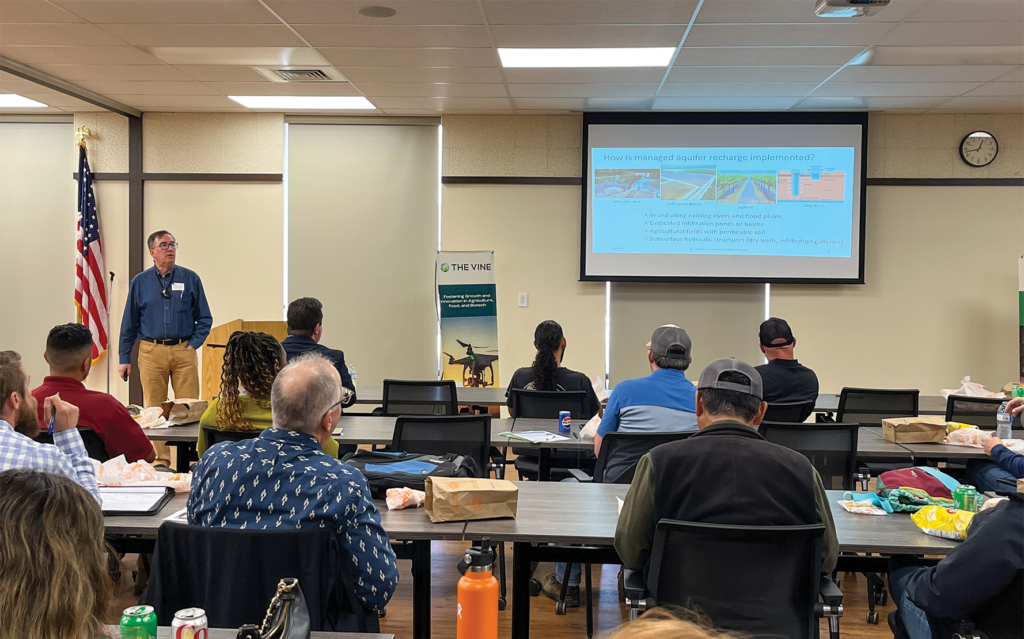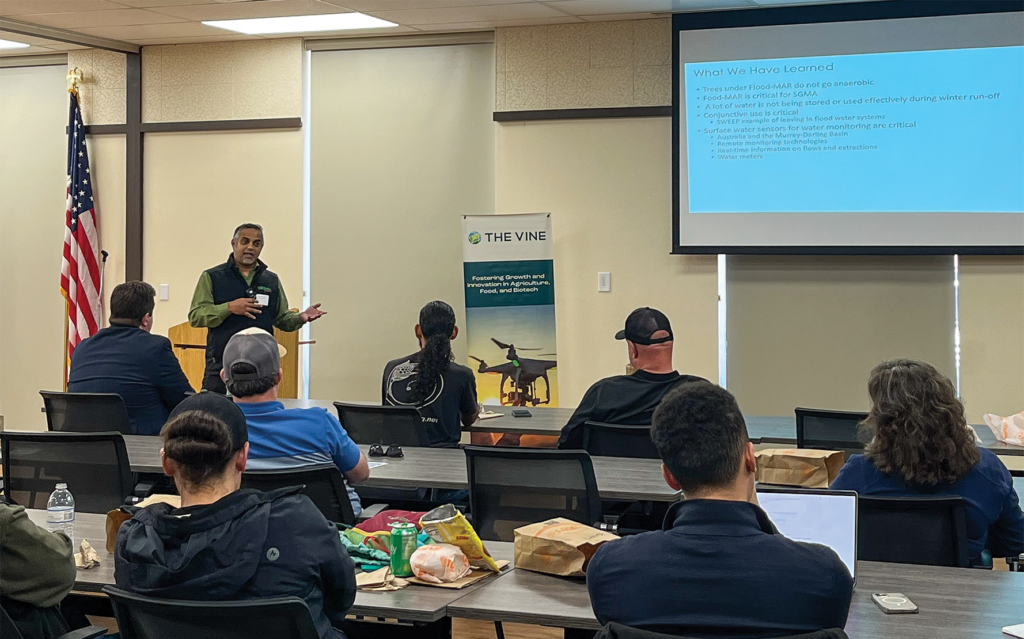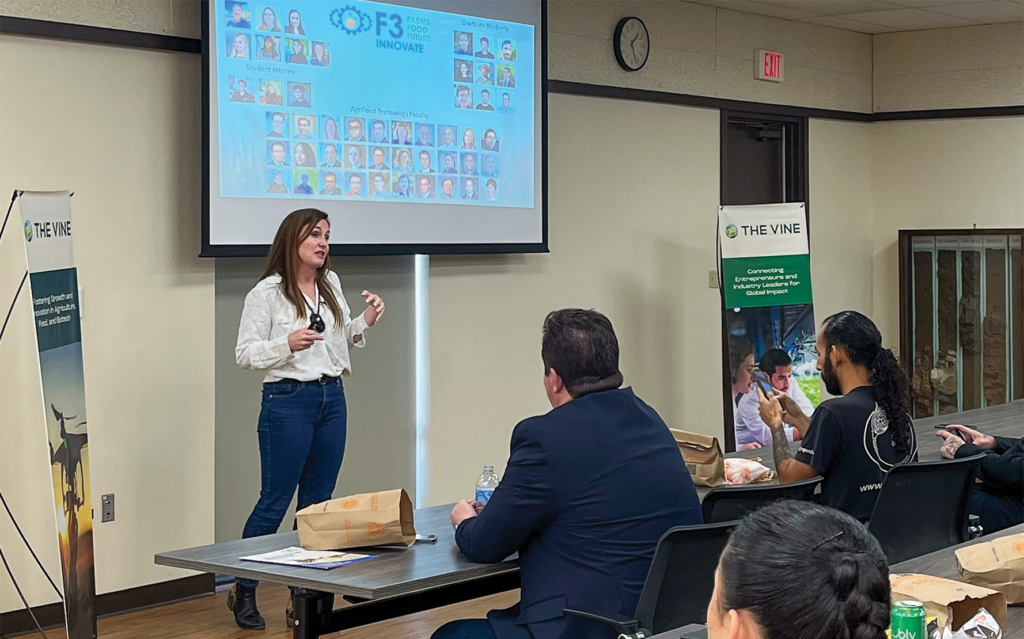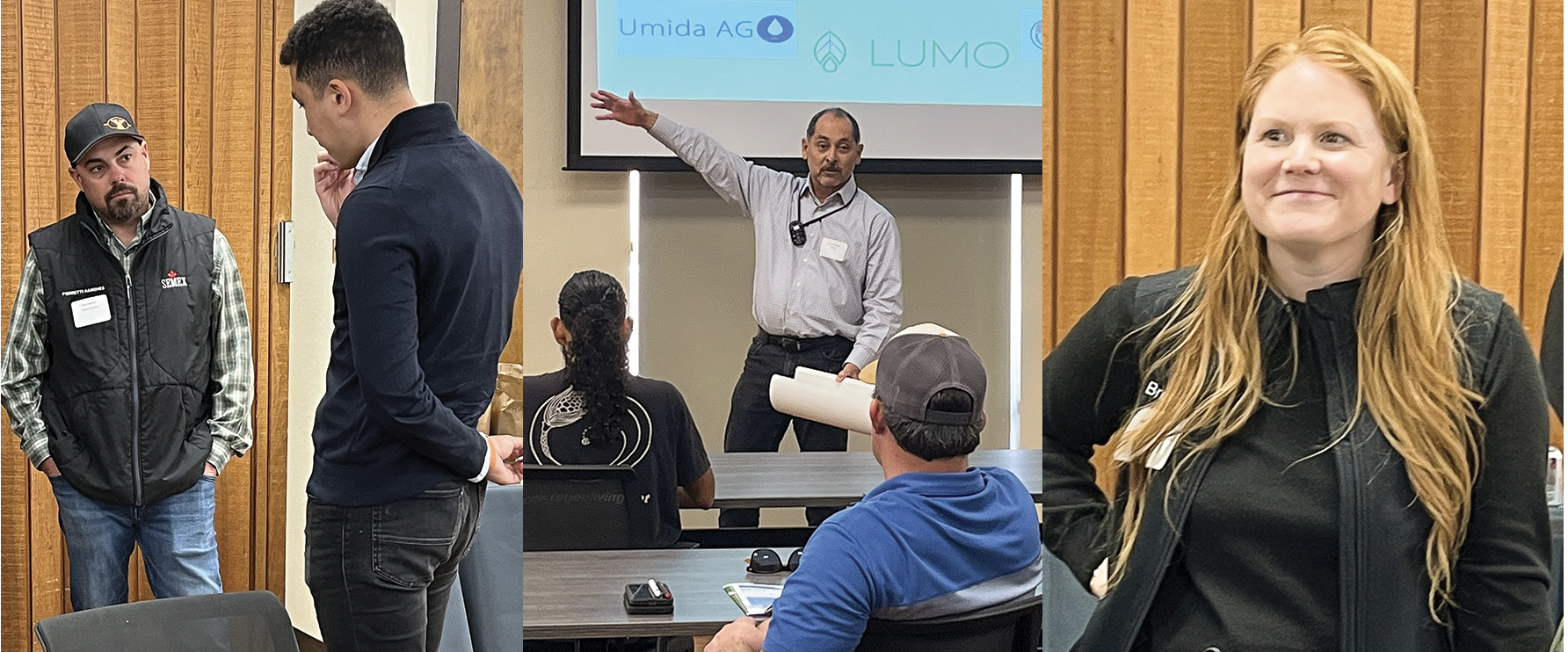On March 6th, we hosted the VINE Connect-Merced, focusing on the critical issue of groundwater recharge, in collaboration with the Merced Farm Bureau and the F3 Initiative. Held at the County Extension Office and featuring contributions from agrifood tech startups, UC researchers, and the local farming community, the event served as a platform for addressing challenges and exploring solutions related to water availability, use, and innovation.
The event centered on talks from Dr. Thomas Harmon of the UC Merced School of Engineering, Dr. Ami Gunasekara from the California Farm Bureau Federation, and Dr. Leigh Bernacchi, leading F3 Innovate Their expertise on topics such as groundwater recharge and the commercialization of technology offered valuable perspectives for the future of farming in the region.
Groundwater Recharge: A Collaborative Effort in Agriculture

Dr. Tom Harmon discussed the importance of addressing challenges in California agriculture through innovation and collaboration, emphasizing the critical role of automation and sustainability in agriculture. He highlighted the efforts towards labor and automation as a means to enhance the work experience and improve sustainability aspects, including environmental compliance. “We try to think about three things simultaneously in all our work,” Harmon remarked. “Those are: what needs to be automated and would benefit from automation in agriculture, how automation can elevate the work experience by working alongside workers to remove the tedious, hard parts of the job, making it a fun and interesting experience, and how, while making all this smart instrumentation, we can also automate sustainability aspects, such as environmental compliance.”
In the realm of groundwater sustainability, Harmon stressed the urgency of aquifer recharge, leveraging both traditional methods and exploring innovative technologies. With a nod to the state’s initiatives and the complexity of this issue, he stated, “The state is taking action, slowly but surely,” underlining the need for a strategic approach to reverse groundwater depletion trends. His discussion extended into multi-benefit land repurposing and the development of tools aimed at supporting groundwater sustainability plans, emphasizing, “It’s akin to a chess game, considering the various blocks of land within the sub-basin: their current use, potential changes, and the feasibility of those changes.”
Harmon concluded by emphasizing the potential of research and development to simplify and enhance the effectiveness of groundwater recharge efforts. He advocated for the practical application of data and technology to achieve sustainability, saying, “R&D is essential for making recharge and assessment both accurate and simple.” Through his insights, Harmon painted a picture of a collaborative, data-informed approach to addressing California’s agricultural and environmental challenges, highlighting the intersection of technology, policy, and practical implementation in driving sustainable practices.
Demystifying California Water Use Myths

Dr. Amrit Gunasekara addressed the topic of water use in California, debunking common misconceptions about agricultural water consumption and highlighting the lack of incentives for groundwater recharge. He pointed out the skewed narrative that agriculture uses 80 percent of the state’s water, a figure that fails to account for environmental allocations. Gunasekara traced the origin of this discussion back to 2012, with increased attention during the severe drought of 2014, and emphasized the foundation’s commitment to presenting accurate data to inform policy. Through economic analysis and collaboration, his goal is to shape a more informed understanding of water distribution and its impact on food prices and agricultural practices.
Focusing on water allocation, Gunasekara explained the distribution among agriculture, urban, and environmental needs, stressing the variability based on annual precipitation. He challenged the prevailing narrative by presenting data on actual water usage: “In a wet year, agriculture receives approximately 29 percent of the captured water. During a dry year, this figure increases to slightly over 50 percent. It’s crucial to note that, regardless of the year’s precipitation levels, agriculture is typically allocated between 30 to 35 million acre-feet of water.” His remarks underscored the importance of accurate data in shaping policies and public opinion, particularly in light of climate variability and resource management challenges.
Gunasekara also advocated for the conjunctive use of water resources and the potential benefits of recharge projects. He highlighted the urgency of utilizing existing infrastructure for flood management and groundwater recharge, suggesting, “We need to make use of the state’s water resources judiciously.” By emphasizing the need for more efficient irrigation methods and the critical role of incentives in supporting these initiatives, Gunasekara’s insights call for a balanced and informed approach to water use in agriculture, aiming to protect both the industry and the environment.
Forging Ag-Tech Partnerships in the San Joaquin Valley

Leigh Bernacchi emphasized UC Merced’s role in bridging the gap between academia and the agricultural industry through the F3 Innovate program. She highlighted the program’s success in securing a landmark federal grant, which, with additional state contributions, amounted to more than $100 million in funding to foster innovation within the San Joaquin Valley. This initiative will develop practical solutions in agriculture technology by facilitating partnerships between industry and academia, offering a significant boost to a region historically underserved by both public and private funding.
Bernacchi detailed how F3 Innovate is poised to transform the agrifood tech landscape by establishing pathways for student involvement, ensuring the retention of local talent and supporting entrepreneurs in their commercialization efforts. She conveyed the program’s broad spectrum of research and development areas, including sustainable agricultural innovations, machine learning, artificial intelligence, and climate-smart technologies. This comprehensive approach will advance technological innovation in agriculture and provide real-world problem-solving opportunities to students.
Furthermore, Bernacchi introduced the UC Merced Experimental Smart Farm, a test bed for exploring diverse agricultural practices and crops, ranging from standard orchards to innovative agrovoltaic systems. This initiative underscores the university’s commitment to research and development in sustainable farming techniques and its openness to collaboration with the industry on new projects. Through F3 Innovate, UC Merced invites the agricultural community to engage in a shared mission to tackle the pressing challenges of the industry, leveraging the university’s resources, expertise, and the energy of its students to drive forward innovation and sustainability in agriculture. “I always say, your future isn’t on Facebook—it’s in farming,” she said.
Spotlight on Innovative Technologies
The VINE Connect-Merced event showcased several innovative technologies aimed at enhancing water management and sustainability in agriculture. Below are summaries of the technologies featured:
- Swan Systems: This company is known for its focus on irrigation technology optimization, providing software and services to support efficient water management. Its system tracks important metrics like soil moisture, drainage, and evapotranspiration to offer a detailed view of water recharge efforts. SWAN Systems also utilizes imagery capabilities to provide insights into crop cover and development, aiming to improve precision in irrigation management by integrating agronomic and business aspects. https://www.swansystems.com
- Umida Ag: The company manufactures the Virtual Water Table Irrigation System, a subsurface infrastructure designed to reduce water use in orchards significantly during dry periods and support groundwater recharging during wet seasons. The technology is dual-purpose, serving both as a high-efficiency irrigation system and a means for groundwater recharge, demonstrating an innovative approach to water conservation. https://umidaag.com
- Regenerative Living: Focuses on creating products and services that aid in rebuilding soil life habitats, promoting a symbiotic microbial community. This approach offers various benefits, such as reducing the need for inputs, suppressing pests and diseases, improving drought and flood resilience, increasing yields, and enhancing groundwater recharge practices. https://www.regenliving.net
- WiseConn: Based in Chile, this company specializes in advanced irrigation solutions, particularly emphasizing the use of telemetry to monitor and control water usage. WiseConn’s approach aims to make farming practices more efficient and environmentally friendly, collaborating with various organizations to improve irrigation techniques and data management. https://wiseconn.com
Thank You to Our Attendees, Speakers, and Innovators
We want to express our sincere appreciation to all the participants of the VINE Connect-Merced event. Your active involvement and interest significantly contributed to the event’s success. It was inspiring to see so many people come together to discuss the vital issue of groundwater recharge and sustainable agricultural practices.
A heartfelt thanks to our speakers, Dr. Thomas Harmon, Dr. Ami Gunasekara, and Dr. Leigh Bernacchi, for sharing their knowledge and insights. Your expertise helped shed light on complex challenges and offered thought-provoking perspectives on future solutions.
We’re also grateful for the innovative work showcased by Swan Systems, Umida Ag, Regenerative Living, and WiseConn. Your contributions to irrigation technology and sustainable farming are essential in moving towards more efficient and environmentally friendly agricultural practices.
Join Us at The VINE Connect – Monterey
Save the Date: join us on May 2, 2024, for The VINE Connect – Monterey, where we’ll explore the future of the agricultural workforce in partnership with the Monterey Bay Economic Partnership and Western Growers. This session will explore the roles of agrifood tech, community colleges, and industry collaborations in shaping our agricultural future.

